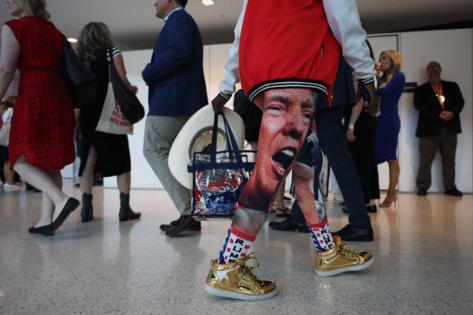Editorial: A strong economy helps incumbents, right? The University of Chicago disagrees
Published in Op Eds
Republican Donald J. Trump’s decisive win in the Nov. 5 election has inspired handwringing among Democrats about how a convicted felon who tried to overturn his 2020 election defeat could beat a mainstream candidate like Vice President Kamala Harris. Now along comes the University of Chicago with an explanation that not only makes some sense but could foreshadow what’s ahead.
The university’s Booth School of Business isn’t usually known for simple answers, but according to a study from two of its professors, the key to Trump’s victory comes down to a surprisingly simple theory: Trump won because the economy was strong under incumbent Joe Biden. That assertion undermines the standard analysis about how inflation, inequality and lack of upward mobility left the electorate angry and disaffected, opening the door to Trump’s populist campaign.
According to the U. of C. study, Americans over the past century have consistently voted Republican when times are good, mostly because they believe the GOP stands for reducing taxes and promoting business. When times are bad, Americans turn to Democrats, who they associate with a stronger safety net and reining in business.
The research results contradict a rival theory that voters were so angry about rising prices that they didn’t recognize the overall strength of today’s economy. “The consensus in the media seems to be that even though the economy is strong, people see it differently,” wrote finance professors Lubos Pastor and Pietro Veronesi. “But we find it hard to believe that Americans elected Trump because they are confused about the economy.”
The professors say most presidential elections back to the 1930s support their theory. Americans were living in the Great Depression when they backed Democrat Franklin D. Roosevelt, and the Great Recession when they went with Democrat Barack Obama. John F. Kennedy, Jimmy Carter and Bill Clinton — all Democrats — took office after sharp downturns.
During economic booms, when America can afford to take a less-than-cautious approach, voters are “more willing to take risks,” as the professors put it, by backing Republicans. Hence, Trump won in 2016 when the economy was good, lost in 2020 when COVID-19 shut down the country and won again in 2024 because, the professors assert, “Risk aversion is low due to the strong economy.”
So is the economy really doing well? Yes, by practically all measures. Inflation is down, unemployment is low, the dollar is strong and the stock market has soared. U.S. consumer sentiment recently ticked up again, suggesting Americans are feeling pretty good despite higher prices for everything from health care to Thanksgiving groceries.
That positive consumer sentiment is especially justified when comparing the U.S. with other large, advanced economies. Europe is lagging, with Germany, its economic engine, flirting with a recession and struggling through a political crisis. The United Kingdom is facing a long-term decline, and Japan’s aging population and low birth rates bode ill for its future. Even Canada, which usually does well when the U.S. does well, is feeling decidedly unwell these days, imperiling the regime of longtime Prime Minister Justin Trudeau.
Still, as anyone familiar with investing has heard many times, past performance is no indication of future results. And, in fact, while the outlook for the U.S. economy is better than that of many other countries, it isn’t exactly rosy.
The Federal Reserve started cutting the interest rates it controls in September not only because inflation was mostly tamed but because other indicators, especially for the labor market, were flashing weakness ahead. And while the stock market gets far more attention, bond markets have been sounding an alarm, as interest rates have been choppy even as the Fed has gone dovish. That means consumers are still paying more than they might for mortgages, auto loans and credit cards.
Further, the stock market boom may be in a late stage. The University of Chicago research indicates that when risk-aversion is low, as it is today, so are expected future gains in the stock market. “Brace for lower-than-usual stock market returns under the new Trump administration,” they warn.
The research suggests that a bad stock market would be more a function of the business cycle rather than “Trump’s fault.” But the president-elect certainly could make matters worse in a hurry.
If Trump follows through on his tariff plan, he’s likely to rekindle inflation. His planned tax cuts would boost the federal budget deficit, nudging interest rates higher. Robert F. Kennedy Jr., Trump’s nominee to run the Department of Health and Human Services, has put a target on Big Agriculture, Big Food and Big Pharma, three industries that have prospered in past GOP administrations. And no one knows what will be the economic impact if Trump, as promised, expels the entrenched U.S. labor force of undocumented immigrants.
Indeed, no one can say for sure what the stock market or U.S. economy will do in the future, and we take simple explanations about election results with healthy skepticism. But if the University of Chicago theory is correct, and hard times indeed favor Democrats, here’s a corollary: Republicans better do what they can to protect the economy, or they may find themselves on the outside looking in when the next presidential election rolls around in 2028.
_____
©2024 Chicago Tribune. Visit at chicagotribune.com. Distributed by Tribune Content Agency, LLC.




























































Comments